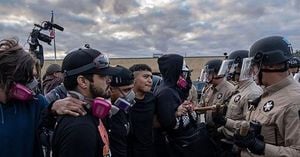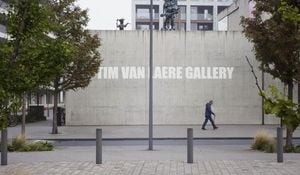Delhi’s air quality has plummeted to alarming levels, prompting significant changes to the educational approach across the national capital region. With the Air Quality Index (AQI) consistently surpassing the 400 mark, health and safety concerns have taken center stage, leading authorities to implement hybrid learning for schools and colleges through the 12th standard.
This shift follows directions from the Supreme Court of India, which recently called on the Commission for Air Quality Management (CAQM) to assess the closure of schools, particularly for students in classes 10 and above. The judges highlighted the detrimental impact of prolonged school closures on students, who rely on mid-day meals and require practical learning environments for their education.
Justice Abhay S Oka and Justice Augustine George Masih led the Supreme Court’s inquiry, stressing the need to reevaluate the decision due to the inadequate air quality at home for many children. Senior Advocate Meneka Guruswamy, representing concerned parents, pointed out the loss of access to mid-day meals for students and the challenges faced by those lacking online resources.
The judges acknowledged this and instructed the CAQM to explore options for easing restrictions on physical classes. They referred to evaluations of the past few years’ AQI readings, noting particularly the necessity of adjusting educational norms according to the Graded Response Action Plan (GRAP), which outlines action stages based on air quality levels.
For the time being, students will transition to hybrid classes—combining online and physical attendance—to mitigate the impact of the pollution crisis on their education. This includes practical lessons which are indispensable for examination preparations.
While addressing the pollution issue, it’s worth noting the root causes, particularly stubble burning, which sees substantial contributions from neighboring states like Punjab and Haryana. The Supreme Court previously mandated stricter implementations of the GRAP measures, reflecting the urgent need for comprehensive action against deteriorative air quality.
Under these circumstances, the CAQM's order explicitly directs governments of the National Capital Territory (NCT) of Delhi and districts within the NCR such as Gurugram, Faridabad, Ghaziabad, and Gautam Buddh Nagar to adopt hybrid learning. The goal is to maintain educational standards without compromising students’ health.
While live online lessons can serve many, there is recognition of the significant disparities across different schools and backgrounds. The CAQM has noted the lack of resources among primary schools to fully transition to online education, highlighting the necessity of providing students options based on their circumstances.
The state governments are encouraged to maintain flexibility, allowing students and their guardians to choose hybrid education wherever feasible. This adaptability acknowledges the variance among families where some may thrive with virtual learning, whereas others may significantly benefit from classroom environments.
Despite the push for reestablishing some physical classes, the Supreme Court did not ease the predicted anti-pollution measures until there is consistent improvement in the AQI levels. Education departments have been tasked with disseminator communication to parents and guardians about these arrangements swiftly.
The court emphasized the importance of continued monitoring and accountability among local governments and police departments concerning compliance with pollution control orders. There have been numerous delays and lapses noted by court commissioners overseeing enforcement compliance, particularly concerning the entry of pollution-causing vehicles.
This hybrid educational model aims not only to protect the health of students but also to nurture their educational needs amid worsening environmental conditions. With winter often accompanying severe air quality challenges, the measures taken are expected to adapt continually based on meteorological updates and pollution data.
Moving forward, the CAQM and educational authorities must work collaboratively to reconcile student needs with public health recommendations. This situation presents unique challenges but equally significant opportunities to reshape how education is delivered during environmental crises.
Considering these circumstances, advocates, parents, and educators alike hope this hybrid approach will provide necessary relief until such time as air quality improves. The importance of accessible education cannot be understated; swift implementation of these measures will determine how effectively the impact of Delhi's air pollution on learning can be mitigated.



